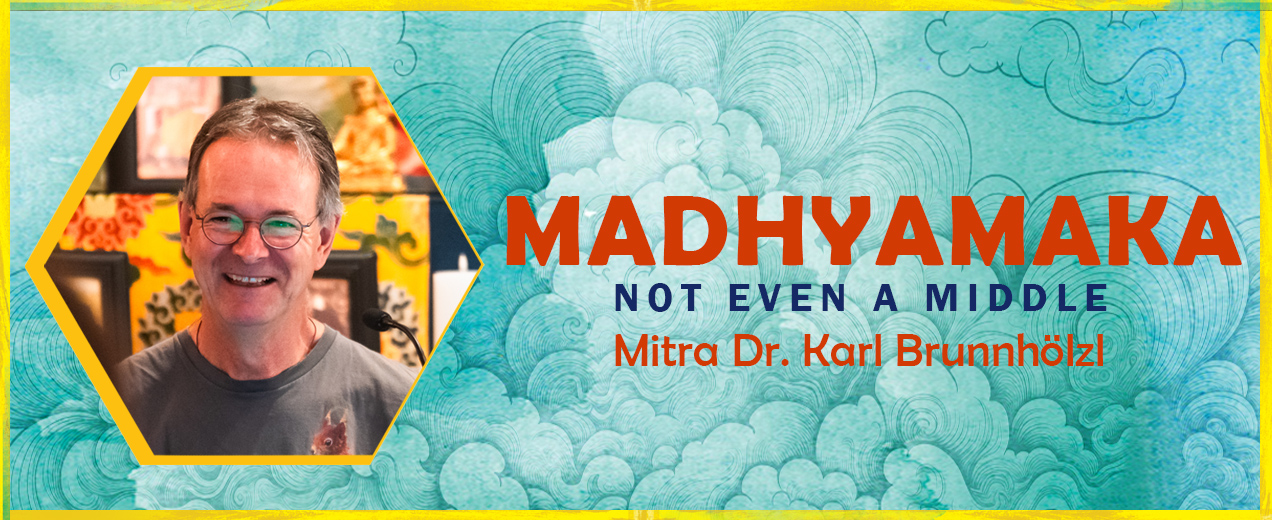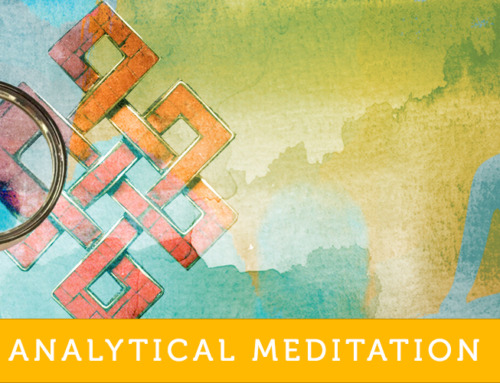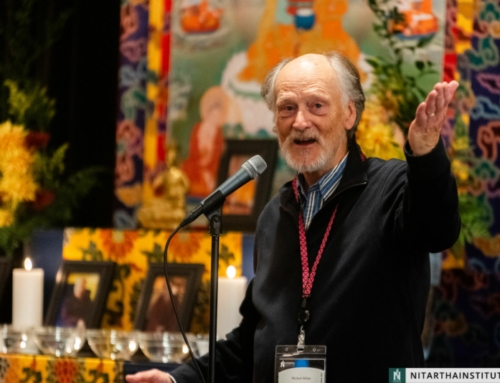Madhyamaka and many more courses will be offered at this year’s Summer Institute in July. The topics are incredible. Don’t miss out! Check out all the information about the 2024 Nitartha Summer Institute here: https://bit.ly/nsi24retreat
Madhyamaka:
a crucial stage on our journey to emptiness
On our journey to emptiness, the Nitartha curriculum takes us through several stages. In the Mind and Its World series, we become familiar with how the data coming in through our senses changes from moment to moment. There is nobody who owns it, there is no personal identity. In the Mind Only class we further discover and learn to appreciate how this manifold experience is merely projected by our own mind.
At the final limit of these analyses, we arrive at the place in which even this imagining mind cannot be said to be truly existent. In the end of this process, if correctly applied, we are freed from all fabrications, that is, all labels and concepts of all types, all points of reference, including duality itself.
Madhyamaka is the philosophical system that guides us with great clarity and precision through this final stage of analysis. This system involves freedom from all conceptual elaborations, which are what keep us cycling in samsara. When experiencing emptiness there is nothing to cling to, thus there is no clinging. And since there is no clinging, there is no suffering. Madhyamaka provides a method for cutting the final ties to our attachments to the mundane world. And it also serves as a remedy for the subtle clinging that can arise when resting in the luminous nature of mind.
Therefore, Madhyamaka is a crucial stage on our journey towards enlightenment. But what is it?
Literally, “Madhya” means middle or center, and “ka” refers to whatever involves or reflects that middle. As for “ma,” in Tibetan this syllable is a negation particle. So the 8th Karmapa, Mikyo Dorje, in accordance with the actual meaning of this term, translates Madhyamaka as “not even a middle,” which is the subtitle of Nitartha’s Madhyamaka course. In our studies of Madhyamaka, we come to understand that there is neither the extreme of existence nor the extreme of non-existence. And if there are no extremes, if there are no two ends, then there cannot be a middle.
But how do we get there? First, we are taken through the history of the Madhyamaka lineage of the Profound View, the genuine line of transmission that we receive, which started with noble Nagarjuna and was passed down to great masters such as Aryadeva, Bhavaviveka, Shantideva and Chandrakirti.
We learn about the view of Madhyamaka through the presentation of the two realities: seeming and ultimate. We discover how to look at our experience through the prism of these two realities, which provides us with a framework for our own spiritual journey.
We also explore how to break down our concepts of things being truly existent through the application of the Five Great Madhayamaka reasonings, called great because they can cut through all elaboration completely and thoroughly, without any distinction. All reference points are gone, those that are irritating as well as those that are pleasing. In this course, we study the five reasonings and learn how to apply them in our practice of analytical meditation on emptiness.
The Madhyamaka tradition also has a method for breaking down personal identity. For this it uses the Seven-fold Analysis of the Chariot. Here we are presented with intriguing questions such as: Is the chariot one of its parts? Or is it a collection of all its parts? Or what?
When practicing analytical meditation, we apply these reasonings not merely to seeds and sprouts and to chariots, but most importantly, to our own mind. The intention behind using the Madhyamaka method is to free our own mind from the bondage of suffering and liberate its inherent potential for kindness and love and compassion.
Dr. Mitra Dr. Karl Brunnhölzl will teach this course (Study Level 2) during the 2024 Summer Institute at Lewis & Clark College (and streamed online). It consists of 27 classes, which are all included in your Summer Institute tuition. Other Buddhist philosophy courses offered this summer are: Buddha Nature and Mind-Only (Study Level 3), and Mind and Its World III and IV for students who have already completed the three Summer Institute Mahamudra and shedra levels.
Here is a complete listing of this year’s Summer Institute’s Buddhist philosophy courses and their prerequisites.
Join us at the Summer Institute onsite in a retreat-like environment at Lewis & Clark College (Portland, Oregon) or online, and discover more about Buddhist philosophical views and how to apply them in your Mahamudra meditation. July’s program also includes special talks by Dzogchen Ponlop Rinpoche on “Mahamudra Lineage Chit-Chat,” daily meditation and onsite enhancement activities.






